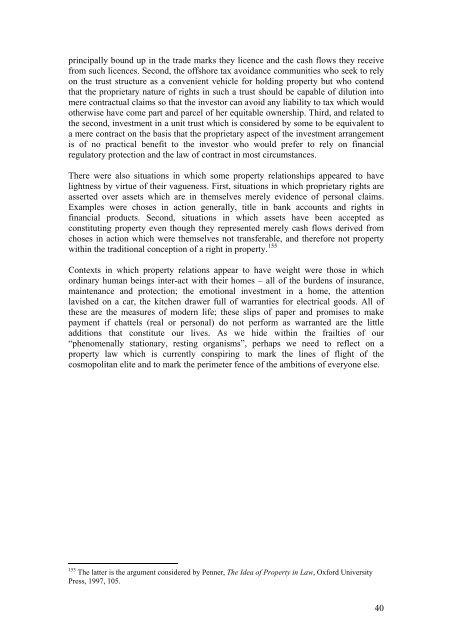The Unbearable Lightness of Property - alastairhudson.com
The Unbearable Lightness of Property - alastairhudson.com
The Unbearable Lightness of Property - alastairhudson.com
You also want an ePaper? Increase the reach of your titles
YUMPU automatically turns print PDFs into web optimized ePapers that Google loves.
principally bound up in the trade marks they licence and the cash flows they receive<br />
from such licences. Second, the <strong>of</strong>fshore tax avoidance <strong>com</strong>munities who seek to rely<br />
on the trust structure as a convenient vehicle for holding property but who contend<br />
that the proprietary nature <strong>of</strong> rights in such a trust should be capable <strong>of</strong> dilution into<br />
mere contractual claims so that the investor can avoid any liability to tax which would<br />
otherwise have <strong>com</strong>e part and parcel <strong>of</strong> her equitable ownership. Third, and related to<br />
the second, investment in a unit trust which is considered by some to be equivalent to<br />
a mere contract on the basis that the proprietary aspect <strong>of</strong> the investment arrangement<br />
is <strong>of</strong> no practical benefit to the investor who would prefer to rely on financial<br />
regulatory protection and the law <strong>of</strong> contract in most circumstances.<br />
<strong>The</strong>re were also situations in which some property relationships appeared to have<br />
lightness by virtue <strong>of</strong> their vagueness. First, situations in which proprietary rights are<br />
asserted over assets which are in themselves merely evidence <strong>of</strong> personal claims.<br />
Examples were choses in action generally, title in bank accounts and rights in<br />
financial products. Second, situations in which assets have been accepted as<br />
constituting property even though they represented merely cash flows derived from<br />
choses in action which were themselves not transferable, and therefore not property<br />
within the traditional conception <strong>of</strong> a right in property. 155<br />
Contexts in which property relations appear to have weight were those in which<br />
ordinary human beings inter-act with their homes – all <strong>of</strong> the burdens <strong>of</strong> insurance,<br />
maintenance and protection; the emotional investment in a home, the attention<br />
lavished on a car, the kitchen drawer full <strong>of</strong> warranties for electrical goods. All <strong>of</strong><br />
these are the measures <strong>of</strong> modern life; these slips <strong>of</strong> paper and promises to make<br />
payment if chattels (real or personal) do not perform as warranted are the little<br />
additions that constitute our lives. As we hide within the frailties <strong>of</strong> our<br />
“phenomenally stationary, resting organisms”, perhaps we need to reflect on a<br />
property law which is currently conspiring to mark the lines <strong>of</strong> flight <strong>of</strong> the<br />
cosmopolitan elite and to mark the perimeter fence <strong>of</strong> the ambitions <strong>of</strong> everyone else.<br />
155 <strong>The</strong> latter is the argument considered by Penner, <strong>The</strong> Idea <strong>of</strong> <strong>Property</strong> in Law, Oxford University<br />
Press, 1997, 105.<br />
40













